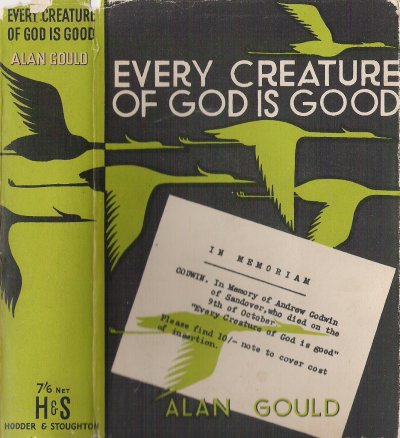
First edition 1939
 First edition 1939 |
The BookAndrew Godwin, in his late twenties, is a clerk in a government office in the west country town of Sandover. He dreams of having enough money to buy luxuries and write full time. He notes that Albert Vines, a junior clerk that he despises, is regularly sent to cash the office's pay cheques and, on those days, is carrying �300 in cash, enough to live on for a year. Godwin speculates about murdering Vines and stealing the money, first working it out as a story and then deciding to carry out the plot. We follow the deed itself, the investigation, the chance exposure of Godwin's crime and his desperate attempts to escape, culminating in a vivid climax as he is hunted on Exmoor. Afterwards everyone is puzzled how someone so likeable could have done such a wicked deed, and somebody pays anonymously for an In Memoriam notice in the paper every year, ending with the line "Every Creature of God is Good" (which comes from I Timothy, 4, 4, where in its original context it is taken as justifying Christians in eating pork rather than a general encouragement to forgive). |
BackgroundThis book was published by Hodder and Stoughton in 1939, the fourth that Canning wrote using the pen-name Alan Gould. It was not reprinted, and the first edition is now quite rare. It explores Dostoyevskian territory. It is a study of a murderer, not asking us to like him but at least to understand him. It starts slowly; we reach page 168, over half way, before the main action begins. However, in the end the long build-up is justified and the story is tense and the characters memorable. Andrew Godwin, the central figure, embodies much of Canning’s own experience and background. He works as a clerk in an education office. He has ambitions to write and contributes to a local newspaper. He is lonely living away from home. He is perpetually short of money. All of these things were true of Canning five years earlier before his breakthrough success with Mr. Finchley Discovers his England. We can be sure that Canning did not commit murder in order to change his circumstances, but he may well have worked out how to as a story plot, which is how Godwin begins. We also see Godwin justifying the crime by pointing to his talents, contrasting this with the apparent worthlessness of the humble Albert Vines. For Vines to die in order that Godwin can create great literature is a bargain that society should be pleased with. Canning probably never seriously thought of himself in these arrogant terms, but he was ready to imagine somebody who might. Canning sets the story in "Brentshire", an imaginary county he has constructed between Gloucestershire and Somerset on the Bristol Channel. This would place the town of Sandover roughly where Clevedon is, but the town he describes with a flourishing port on a muddy estuary resembles more Burnham-on-Sea, close to Weston-super-Mare where Canning had lived and worked from 1930 to 1934. |
Review by Frank Swinnerton, The Observer, 5 February 1939Mr. Alan Gould’s murder is not a mystery to the reader, who sees it committed. But the character of the murderer is full of strange darkness; and it is upon this character that the book, Every Creature of God is Good, depends for its ultimate plausibility. The general scene, which is that of a West Country seaside resort, is quietly rendered, and there are good pictures of the staff of the local Education Committee. From their number one man, whose name is Godwin, emerges. He is a bachelor, dissatisfied with his lot; with literary ambitions, and without urgent talent or urgent affections. His hobby is bird-watching. His one aim is escape from drudgery. As a step towards this, knowing that a member of the staff each week at a certain time brings wages from the bank by a definite route, he coolly plans a murder and carries it out exactly as planned. From that point Every Creature of God is Good, which has been neat and competent, becomes a different, very exciting, and powerful book. It so remains until the end. Mr. Gould has done good work in the past; but I do not think he has hitherto done anything as good as this. It deserves to be very successful. |